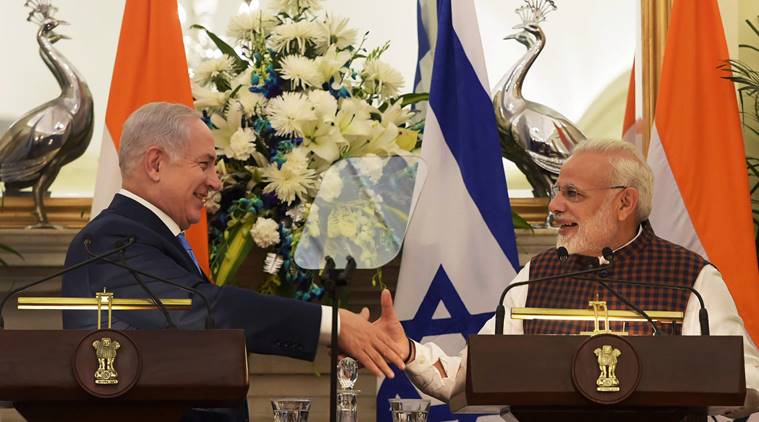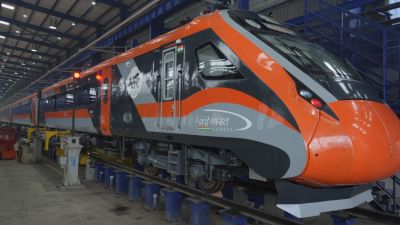While Prime Minister Narendra Modi hosted a lunch for his Israeli counterpart Benjamin Netanyahu Monday after bilateral talks, a live rendition of “Ichak dana bichak dana” — from the iconic Raj Kapoor movie Shree 420 — was played and a number of Israeli officials joined in saying they knew the Bollywood number well.

And, in a bid to strengthen defence cooperation – the centre-piece of the bilateral relationship – Modi, who referred to Netanyahu as “my friend” several times, Monday invited Israeli defence companies to take advantage of the liberalised FDI regime and participate in “Make in India” with Indian companies. This was New Delhi’s one of the most pronounced public articulation of Indo-Israeli defence cooperation in the last two-and-half decades.
In the joint statement, they “called on the Defence ministries to hold discussions in 2018 with active involvement of the public and private sectors, in order to create the basis for viable, sustainable and long term cooperation in the defence industry”.
READ | Israeli PM Benjamin Netanyahu Day 2 in India HIGHLIGHTS
So far, defence companies and the armed forces have imported technologies from Israel, and the government has always kept it quiet. Sources told The Indian Express that this is a clear signal that the BJP-led NDA government has decided to take defence cooperation “out of the shadows”.
According to the joint statement, both Prime Ministers noted that Israeli companies were ready to start joint ventures with Indian companies in the defence sector under the Make in India initiative. They consider it important to set the direction for developing more business models and partnerships for the joint ventures and joint manufacturing, including transfer of technology as well as joint research and development in defence and security fields.
As the two sides discussed security cooperation, they ventured into cyber security – which has so far remained an area of cooperation between Israel’s and Indian private firms. This is the first time, sources said, there will be cooperation at the government level – between top cyber security agencies of the two countries. This assumes significance since many cyber attacks in India have originated from China, Iran and North Korea among other countries.
Story continues below this ad
Stressing that terrorism posed a grave threat to peace and security including from non-state actors, the two leaders reiterated that there can be “no justification for acts of terror on any grounds whatsoever and advocated strong measures against terrorists, terror organisations, those who sponsor, encourage or finance terrorism or provide sanctuary to terrorists and terror groups”.
The two leaders decided that the next meeting of the Joint Working Groups on Homeland and Public Security will be held in February 2018, and the two countries reiterated the importance of building comprehensive cooperation in counter-terrorism, including cyber-space, and welcomed the signing of the MoU on Cooperation in Cyber Security between India and Israel.
See Photos | Netanyahu lauds PM Modi for revolutionising India-Israel relations
There was a noticeable difference compared to the joint statement issued during Modi’s visit to Israel in July 2017. While last year, both leaders committed to cooperate for the early adoption of the Comprehensive Convention on International Terrorism (CCIT), this time, there was no such reiteration.
Story continues below this ad
On his part, Netanyahu said Indians and Israelis know the “true pain” of a terror attacks. “We are talking about cooperation in (the field of) defence so that our people are always safe and secure. We
remember the horrific savagery in Mumbai (a reference to 26/11 terror attack), we grate our teeth, we fight back, (and) we never give in,” the Israeli premier said.
The issue of India voting against Israel at the UN on the East Jerusalem issue also figured in the talks in which Indian officials maintained that both sides put forth their views and that the two leaders agreed that ties “are not determined by a single issue”.
“What the two sides agreed, that the our relationship was much larger than any single issue…that we need to look at it holistically and while we continue to talk to each other, our relationship is not determined by a single issue,” Vijay Gokhale, Secretary (Economic Relations) in the Ministry of External Affairs, said.
READ | Full Text of PM Modi, Netanyahu joint statement
Story continues below this ad
On the Palestine issue, the joint statement said that the two Prime Ministers discussed developments pertaining to the Israeli-Palestinian Peace Process. “They reaffirmed their support for an early resumption of peace talks between Israelis and Palestinians for arriving at a comprehensive negotiated solution on all outstanding issues, based on mutual recognition and effective security arrangements, for establishing a just and durable peace in the region,” it said, without any specific reference to the status of East Jerusalem.
However, there was a reference to “early resumption of peace talks” – a key area of concern in the international fraternity. India had last month joined 127 other countries to vote in the UN in favour of a resolution opposing the recent decision of the US to recognise Jerusalem as Israel’s capital.
Describing their talks as “wide-ranging and intensive”, Modi said they reviewed the progress in the bilateral relations and agreed that “the possibilities and the opportunities” that beckon the two countries need to be seized.
“We will strengthen the existing pillars of cooperation in areas that touch the lives of our peoples. These are agriculture, science and technology, and security.”
Story continues below this ad
Netanyahu described Modi as a “revolutionary” leader. “You are a revolutionary leader and you are revolutionising India. You are catapulting this magnificent state into the future. And you have revolutionised the relations between Israel and India,” Netanyahu told Modi.
Stressing that their discussions were marked by the desire to do more, Modi said, “Prime Minister, I have a reputation of being impatient in getting results. If I may let out an open secret, I know that so are you.”
He said last year in Tel Aviv, Netanyahu had expressed the intent to cut down bureaucratic red tape with a machete and forge ahead with speed. “I am happy to tell you that in India, we are well on our way to doing just that. We have imparted our shared impatience to the implementation of our earlier decisions,” he said.
On whether the multi-million Israeli missile Spike deal figured in the talks, Gokhale, avoided specifics and said merely said that defence and security cooperation was discussed.
Story continues below this ad
Apart from a pact on cyber security, the two sides signed agreements which included cooperation in the oil and gas sector, film-co- production as well as amendments to an air transport pact.
In a bid to strengthen bilateral trade and investment, the two sides will hold the next round of discussions in February 2018 in Israel. “Underlining the role of the private sector in trade and investment, both Prime Ministers urged the private sector to actively explore investment opportunities in both countries, including through the India’s flagship programmes such as Make in India, Start-Up India and Digital India,” the joint statement said.
They also announced joint research and development projects under the India-Israel Industrial R&D and Technological Innovation Fund (I4F).
The two sides also agreed to holding Festivals of India and Israel in their respective countries in the Year 2019 as a further step to “solidify friendship between the peoples of both countries”, the statement said.
Story continues below this ad
On Tuesday, Israel’s Prime Minister and his wife, Sara, will be visiting Agra to see the Taj Mahal. Netanyahu is likely to attend the Raisina dialogue on Tuesday evening, where he will make the inaugural address.

 Prime Minister Narendra Modi and his Israeli counterpart Benjamin Netanyahu during a joint press conference at Hyderabad House in New Delhi. (Source: PTI)
Prime Minister Narendra Modi and his Israeli counterpart Benjamin Netanyahu during a joint press conference at Hyderabad House in New Delhi. (Source: PTI)






